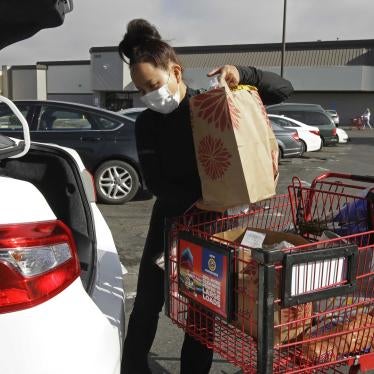Dear Ms. Caruso:
We are writing to you from Human Rights Watch, which is a global non-governmental organization that monitors violations of human rights by state and non-state actors in more than 90 countries around the world.
We have been conducting research for publication on the impact of Shipt’s policies and practices on the rights of Shipt shoppers and delivery workers classified as independent contractors (in the following referred to as “Shipt workers”) in California and other parts of the country. In the interest of thorough and objective reporting, we are seeking your comment.
The research we are planning to publish finds that the misclassification of Shipt workers as independent contractors is undermining their rights to a decent living and safe and healthy working conditions.
Under state and federal employment law, independent contractors are not entitled to basic labor protections like the applicable minimum wage standard, guaranteed sick pay, unemployment assistance, or the ability to join a union.
The lack of minimum wage protections has enabled Shipt to roll out black box algorithms to calculate workers’ pay in California. Shipt is also intending to roll out these pay algorithms nationwide.
Shipt’s algorithms generate an estimated pay range for each order based on factors such as estimated shop and travel time. Shipt guarantees the lower end of the pay range. However, Shipt has failed to provide any other information to workers about how these algorithms operate.
Workers have complained that the algorithm is creating unpredictable fluctuations in their earnings, driving down their earnings by as much as 30 percent. Because of these practices, we have found that workers are vulnerable to earning below the applicable state or local minimum wage on your platform.
Problems with accessing tips have also exacerbated workers’ struggles with low wages. In April 2020, workers reported that they were not receiving tips that their customers had confirmed they had paid. Multiple customers were also not presented the option to tip after the order was delivered. In August 2020, your company acknowledged these errors and promised to refund tips to affected workers and an additional $5 as well as audit all tipped and failed orders quarterly.
Despite these corrective measures, these incidents illustrate the extent to which workers are vulnerable to tip-related abuses in the absence of meaningful legal protections protecting employees’ tips. The lack of wage transparency also instills fear among workers that Shipt could covertly introduce other practices to wrongfully reduce or withhold their tips in the future.
Shipt workers are not legally entitled to paid sick leave because they are misclassified as independent contractors, and Shipt does not have a paid sick leave policy. We are concerned that this not only jeopardizes the health and safety of workers, but also Shipt’s customers and the broader public. At least one worker we interviewed continued to work for the platform despite having Covid-19 symptoms because she could not risk losing her income. When she reported a positive test result for Covid-19 antibodies in June, she was deactivated from the platform.
Workers are also not legally entitled to workers’ compensation as a result of injuries they experience while fulfilling a shopping or delivery request for Shipt. At least one worker we interviewed who was injured on the job lost income for a few weeks because she was unable to work.
We have not come across any information indicating your position on Proposition 22, a ballot initiative in California that would exempt your company from complying with AB5, a law passed late last year that would reclassify many gig workers as employees and guarantee them minimum wage and other labor protections under the California Labor Code.
Prop 22 instead proposes a wage formula that pays workers at least 120 percent of the applicable minimum wage while they are fulfilling orders, plus thirty cents for each mile traveled to complete delivery. It fails to account for the hours they spend waiting on the Shipt app for shopping requests. The mileage reimbursement is also only about half the 2020 rate set by the IRS; all other expenses remain the responsibility of workers.
In addition to providing us with comment on the above, we have attached a list of questions that we hope you will answer.
We would appreciate your response to the attached questions, or comments on the issues described in this letter, by September 22, 2020. We would also be happy to discuss these issues with you or your staff. If you have any questions or would like to schedule a remote meeting, please contact Namratha Somayajula at somayan@hrw.org.
We thank you in advance for your attention to this matter.
Sincerely,
Amos Toh
Senior Researcher and Advocate
Artificial Intelligence and Human Rights
Lena Simet
Senior Researcher and Advocate
Poverty and Inequality
Please see the following links for further Human Rights Watch correspondence with Shipt on this matter:
Email from Human Rights Watch to Shipt, dated October 7, 2020
Response from Shipt to Human Rights Watch, dated October 9, 2020






